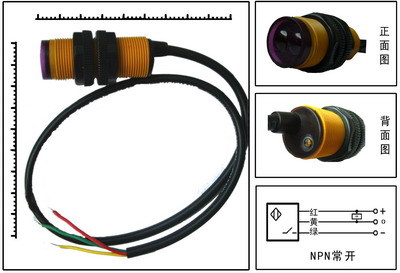139741 Arduino Infrared Obstacle Avoidance Detection Photoelectric Sensor: Difference between revisions
Jump to navigation
Jump to search
No edit summary |
No edit summary |
||
| (2 intermediate revisions by the same user not shown) | |||
| Line 1: | Line 1: | ||
[[Image:547132375_615.jpg|400px|thumb|right|E18-D50NK]] |
|||
[http://www.dealextreme.com/p/139741 Arduino Infrared Obstacle Avoidance Detection Photoelectric Sensor] |
[http://www.dealextreme.com/p/139741 Arduino Infrared Obstacle Avoidance Detection Photoelectric Sensor] |
||
| Line 13: | Line 16: | ||
* Wiring: |
* Wiring: |
||
** red (DC 4.5~5V power high level) |
** red (DC 4.5~5V power high level) |
||
** yellow (microcontroller) |
** yellow (microcontroller) yellow is signal (with 10KOhm to the +) |
||
** green (GND 0V power low level) |
** green (GND 0V power low level) |
||
see also [http://www.dealextreme.com/p/obstacle-avoidance-ir-robotic-sensor-yellow-black-dc-5v-148556?item=22 Obstacle Avoidance IR Robotic Sensor for Arduino - Yellow + Black (DC 5V)] |
see also [http://www.dealextreme.com/p/obstacle-avoidance-ir-robotic-sensor-yellow-black-dc-5v-148556?item=22 Obstacle Avoidance IR Robotic Sensor for Arduino - Yellow + Black (DC 5V)] |
||
==Arduino sketch== |
|||
<pre> |
|||
/* |
|||
Code sample for 139741 Arduino Infrared Obstacle Avoidance Detection Photoelectric Sensor |
|||
Output current: 100mA |
|||
Working voltage: DC 5V |
|||
Current consumption: DC < 25mA |
|||
Response time: < 2ms |
|||
Sensing angle: Less than 15 degree |
|||
Detecting range: 3~80 cm |
|||
Working temperature: -25~55'C |
|||
Wiring: |
|||
red (DC 4.5~5V power high level) |
|||
yellow (Pin A0 microcontroller) |
|||
green (GND 0V power low level) |
|||
This code is in the public domain. |
|||
*/ |
|||
const int analogInPin = A0; // Analog input pin that the sensor is attached to |
|||
int sensorValue = 0; // value read from the pot |
|||
void setup() { |
|||
// initialize serial communications at 9600 bps: |
|||
Serial.begin(9600); |
|||
} |
|||
void loop() { |
|||
// read the analog in value: |
|||
sensorValue = analogRead(analogInPin); |
|||
// print the results to the serial monitor: |
|||
Serial.print("sensor = " ); |
|||
Serial.print(sensorValue); |
|||
Serial.print("\t distance = "); |
|||
Serial.println(map(sensorValue, 0, 1023, 3, 80)); |
|||
// wait 2 milliseconds before the next loop |
|||
// for the analog-to-digital converter to settle |
|||
// after the last reading: |
|||
delay(2); |
|||
} |
|||
</pre> |
|||
Latest revision as of 22:33, 15 January 2015
Arduino Infrared Obstacle Avoidance Detection Photoelectric Sensor
Transmitter and receiver photoelectric sensor set; Voltage: DC 5V, current: 100mA, detection range: 3~80cm (adjustable); with potentiometer and output indicator light on the back
- Output current: 100mA
- Working voltage: DC 5V
- Current consumption: DC < 25mA
- Response time: < 2ms
- Sensing angle: Less than 15 degree
- Detecting range: 3~80 cm
- Working temperature: -25~55'C
- Wiring:
- red (DC 4.5~5V power high level)
- yellow (microcontroller) yellow is signal (with 10KOhm to the +)
- green (GND 0V power low level)
see also Obstacle Avoidance IR Robotic Sensor for Arduino - Yellow + Black (DC 5V)
Arduino sketch
/*
Code sample for 139741 Arduino Infrared Obstacle Avoidance Detection Photoelectric Sensor
Output current: 100mA
Working voltage: DC 5V
Current consumption: DC < 25mA
Response time: < 2ms
Sensing angle: Less than 15 degree
Detecting range: 3~80 cm
Working temperature: -25~55'C
Wiring:
red (DC 4.5~5V power high level)
yellow (Pin A0 microcontroller)
green (GND 0V power low level)
This code is in the public domain.
*/
const int analogInPin = A0; // Analog input pin that the sensor is attached to
int sensorValue = 0; // value read from the pot
void setup() {
// initialize serial communications at 9600 bps:
Serial.begin(9600);
}
void loop() {
// read the analog in value:
sensorValue = analogRead(analogInPin);
// print the results to the serial monitor:
Serial.print("sensor = " );
Serial.print(sensorValue);
Serial.print("\t distance = ");
Serial.println(map(sensorValue, 0, 1023, 3, 80));
// wait 2 milliseconds before the next loop
// for the analog-to-digital converter to settle
// after the last reading:
delay(2);
}
